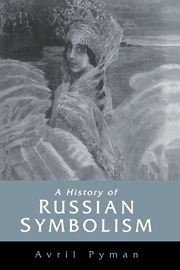Book contents
- Frontmatter
- Contents
- Preface
- Acknowledgements
- Note on the text and list of abbreviations
- Prologue: decadence or rebirth? The European fin de siècle and the Russian precursors
- Part 1 The art of the cell
- Part 2 Collective creation
- 4 The foundation of Mir Iskusstva and the role of the visual and performing arts. Benois, Diagilev, Filosofov and their group (1890–1904)
- 5 From Mir Iskusstva to Novyi Put'. The development of Merezhkovsky's prose and thought, Rozanov, Shestov (1898–1904)
- 6 Russian Symbolism comes of age. Skorpion, Severnye Tsvety and Vesy. Briusov as organiser and teacher (1900–4)
- Part 3 Gleams of paradise
- Part 4 A glittering hell
- Part 5 Our home from the beginning
- Epilogue
- Chronology
- Notes
- Bibliography
- Index
6 - Russian Symbolism comes of age. Skorpion, Severnye Tsvety and Vesy. Briusov as organiser and teacher (1900–4)
Published online by Cambridge University Press: 08 January 2010
- Frontmatter
- Contents
- Preface
- Acknowledgements
- Note on the text and list of abbreviations
- Prologue: decadence or rebirth? The European fin de siècle and the Russian precursors
- Part 1 The art of the cell
- Part 2 Collective creation
- 4 The foundation of Mir Iskusstva and the role of the visual and performing arts. Benois, Diagilev, Filosofov and their group (1890–1904)
- 5 From Mir Iskusstva to Novyi Put'. The development of Merezhkovsky's prose and thought, Rozanov, Shestov (1898–1904)
- 6 Russian Symbolism comes of age. Skorpion, Severnye Tsvety and Vesy. Briusov as organiser and teacher (1900–4)
- Part 3 Gleams of paradise
- Part 4 A glittering hell
- Part 5 Our home from the beginning
- Epilogue
- Chronology
- Notes
- Bibliography
- Index
Summary
Романтизм, реализм, символизм — это три стадии в борьбе за свободу. Они свергли наконец цепи рабствования разным случайным целям. Ныне искусство наконец свободно …
Валерий Брюсов.In a sense, the creative writers of St Petersburg could afford to let Mir Iskusstva and Novyi Put' slip from their control because of the new publishing opportunities, provided by the publishing house Skorpion. The establishment of this venture in 1900 led to the regular appearance, from 1901 to 1905, of the ‘decadent’ almanac Severnye Tsvety, called after Pushkin's Northern Flowers, and, from 1904 to 1909, of the periodical Vesy. ‘Skorpion’ was a Moscow initiative run by literati of the Moscow school and financed by Moscow money. The prime organiser was Briusov, but the original impulse came from Bal′mont.
In 1899, Bal′mont, having cemented his public association with Briusov by the publication of Kniga razdumii – in which the two poets had debated, in an antiphonal exchange of poems, their differing views on art and life – spent the summer as a guest on the country estate of Sergei Aleksandrovich Poliakov in pursuit of inspiration and the female poet Nina Lokhvitskaia. Here, enraptured by the company, the beauty of nature and the fashionable craze for Nietzschean self-assertion, Bal′mont wrote his most immediately successful body of poetry, which was to form the bulk of a new collection under the suitably vivid and catastrophic title Goriashchie zdaniia (Burning Buildings, the Lyric Poetry of a Contemporary Soul).
- Type
- Chapter
- Information
- A History of Russian Symbolism , pp. 160 - 180Publisher: Cambridge University PressPrint publication year: 1994



